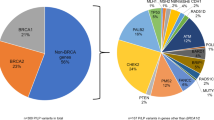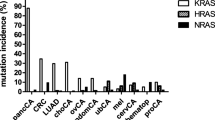Abstract
Microsatellite instability (MSI) is present in more than 90% of colorectal cancers of patients with Lynch syndrome, and is therefore a feasible marker for the disease. Mutations in MLH1, MSH2, MSH6 and PMS2, which are one of the main causes of deficient mismatch repair and subsequent MSI, have been linked to the disease. In order to establish the role of each of the 4 genes in Slovenian Lynch syndrome patients, we performed MSI analysis on 593 unselected CRC patients and subsequently searched for the presence of point mutations, larger genomic rearrangements and MLH1 promoter hypermethylation in patients with MSI-high tumours. We detected 43 (7.3%) patients with MSI-H tumours, of which 7 patients (1.3%) harboured germline defects: 2 in MLH1, 4 in MSH2, 1 in PMS2 and none in MSH6. Twenty-nine germline sequence variations of unknown significance and 17 deleterious somatic mutations were found. MLH1 promoter methylation was detected in 56% of patients without detected germline defects and in 1 (14%) suspected Lynch syndrome. Due to the minor role of germline MSH6 mutations, we adapted the Lynch syndrome detection strategy for the Slovenian population of CRC patients, whereby germline alterations should be first sought in MLH1 and MSH2 followed by a search for larger genomic rearrangements in these two genes. When no germline mutations are found tumors should be further tested for the presence of germline defects in PMS2 and MSH6. The choice about which gene should be tested first can be guided more accurately by the immunohistochemical analysis. Our study demonstrates that the incidence of MMR mutations in a population should be known prior to the application of one of several suggested strategies for detection of Lynch syndrome.


Similar content being viewed by others
Abbreviations
- MSI:
-
Microsatellite instability
- HNPCC:
-
Hereditary non-polyposis colorectal cancer
- CRC:
-
Colorectal cancer
- MMR:
-
Mismatch repair
- MSI-H:
-
High level of microsatellite instability
- MSI-L:
-
Low level of microsatellite instability
- MSS:
-
Microsatellite stable
- PMRP:
-
Pentaplex mononucleotide repeat panel
- DHPLC:
-
Denaturating high performance liquid chromatography
- MLPA:
-
Multiplex ligation-dependent probe amplification
- MS-MLPA:
-
Methylation specific MLPA
- ESE:
-
Exonic splice enhancers
References
Abdel-Rahman WM, Mecklin JP, Peltomaki P (2006) The genetics of HNPCC: application to diagnosis and screening. Crit Rev Oncol Hematol 58:208–220. doi:10.1016/j.critrevonc.2005.11.001
Terdiman JP, Gum JR Jr, Conrad PG et al (2001) Efficient detection of hereditary nonpolyposis colorectal cancer gene carriers by screening for tumor microsatellite instability before germline genetic testing. Gastroenterology 120:21–30. doi:10.1053/gast.2001.20874
Peltomaki P, Vasen H (2004) Mutations associated with HNPCC predisposition update of ICG-HNPCC/INSiGHT mutation database. Dis Markers 20:269–276
Boland CR, Thibodeau SN, Hamilton SR et al (1998) A national cancer institute workshop on microsatellite instability for cancer detection and familial predisposition: development of international criteria for the determination of microsatellite instability in colorectal cancer. Cancer Res 58:5248–5257
Ionov Y, Peinado MA, Malkhosyan S et al (1993) Ubiquitous somatic mutations in simple repeated sequences reveal a new mechanism for colonic carcinogenesis. Nature 363:558–561. doi:10.1038/363558a0
Herman JG, Umar A, Polyak K et al (1998) Incidence and functional consequences of hMLH1 promoter hypermethylation in colorectal carcinoma. Proc Natl Acad Sci USA 95:6870–6875. doi:10.1073/pnas.95.12.6870
Potocnik U, Glavac D, Golouh R et al (2001) Causes of microsatellite instability in colorectal tumors: implications for hereditary non-polyposis colorectal cancer screening. Cancer Genet Cytogenet 126:85–96. doi:10.1016/S0165-4608(00)00399-X
Umar A, Risinger JI, Hawk ET et al (2004) Testing guidelines for hereditary non-polyposis colorectal cancer. Nat Rev Cancer 4:153–158
Suraweera N, Duval A, Reperant M et al (2002) Evaluation of tumor microsatellite instability using five quasimonomorphic mononucleotide repeats and pentaplex PCR. Gastroenterology 123:1804–1811. doi:10.1053/gast.2002.37070
Umar A, Boland CR, Terdiman JP et al (2004) Revised bethesda guidelines for hereditary nonpolyposis colorectal cancer (Lynch syndrome) and microsatellite instability. J Natl Cancer Inst 96:261–268
de Sanchez AA, Tosar A, Godino J et al (2005) Low prevalence of germline hMSH6 mutations in colorectal cancer families from Spain. World J Gastroenterol 11:5770–5776
Truninger K, Menigatti M, Luz J et al (2005) Immunohistochemical analysis reveals high frequency of PMS2 defects in colorectal cancer. Gastroenterology 128:1160–1171. doi:10.1053/j.gastro.2005.01.056
Plaschke J, Kruppa C, Tischler R et al (2000) Sequence analysis of the mismatch repair gene hMSH6 in the germline of patients with familial and sporadic colorectal cancer. Int J Cancer 85:606–613. doi:10.1002/(SICI)1097-0215(20000301)85:5<606::AID-IJC2>3.0.CO;2-B
Wijnen J, Vasen H, Moller P et al (1999) Familial endometrial cancer in female carriers of MSH6 germline mutations. Nat Genet 23:142–144. doi:10.1038/13773
Dovrat S, Figer A, Fidder HH et al (2005) Mutational analysis of hMsh6 in Israeli HNPCC and HNPCC-like families. Fam Cancer 4:291–294. doi:10.1007/s10689-005-1255-7
Kets CM, Krieken JH, Hebeda KM et al (2006) Very low prevalence of germline MSH6 mutations in hereditary non-polyposis colorectal cancer suspected patients with colorectal cancer without microsatellite instability. Br J Cancer 95:1678–1682. doi:10.1038/sj.bjc.6603478
Liu T, Yan H, Kuismanen S et al (2001) The role of hPMS1 and hPMS2 in predisposing to colorectal cancer. Cancer Res 61:7798–7802
Wang Q, Lasset C, Desseigne F et al (1999) Prevalence of germline mutations of hMLH1, hMSH2, hPMS1, hPMS2, and hMSH6 genes in 75 French kindreds with nonpolyposis colorectal cancer. Hum Genet 105:79–85. doi:10.1007/s004390051067
Hendriks YM, Jagmohan-Changur S, Klift HM et al (2006) Heterozygous mutations in PMS2 cause hereditary nonpolyposis colorectal carcinoma (Lynch syndrome). Gastroenterology 130:312–322. doi:10.1053/j.gastro.2005.10.052
Clendenning M, Hampel H, LaJeunesse J et al (2006) Long-range PCR facilitates the identification of PMS2-specific mutations. Hum Mutat 27:490–495. doi:10.1002/humu.20318
Hegde M, Blazo M, Chong B et al (2005) Assay validation for identification of hereditary nonpolyposis colon cancer-causing mutations in mismatch repair genes MLH1, MSH2, and MSH6. J Mol Diagn 7:525–534
Thompson E, Meldrum CJ, Crooks R et al (2004) Hereditary non-polyposis colorectal cancer and the role of hPMS2 and hEXO1 mutations. Clin Genet 65:215–225. doi:10.1111/j.1399-0004.2004.00214.x
Hampel H, Frankel WL, Martin E et al (2005) Screening for theLynch syndrome (hereditary nonpolyposis colorectal cancer). N Engl J Med 352:1851–1860. doi:10.1056/NEJMoa043146
Bunyan DJ, Eccles DM, Sillibourne J et al (2004) Dosage analysis of cancer predisposition genes by multiplex ligation-dependent probe amplification. Br J Cancer 91:1155–1159. doi:10.1038/sj.bjc.6602121
Xicola RM, Llor X, Pons E et al (2007) Performance of different microsatellite marker panels for detection of mismatch repair-deficient colorectal tumors. J Natl Cancer Inst 99:244–252. doi:10.1093/jnci/djk033
Salovaara R, Loukola A, Kristo P et al (2000) Population-based molecular detection of hereditary nonpolyposis colorectal cancer. J Clin Oncol 18:2193–2200
Warusavitarne J, Schnitzler M (2007) The role of chemotherapy in microsatellite unstable (MSI-H) colorectal cancer. Int J Colorectal Dis 22:739–748. doi:10.1007/s00384-006-0228-0
Ravnik-Glavac M, Potocnik U, Glavac D (2000) Incidence of germline hMLH1 and hMSH2 mutations (HNPCC patients) among newly diagnosed colorectal cancers in a Slovenian population. J Med Genet 37:533–536. doi:10.1136/jmg.37.7.533
Peterlongo P, Nafa K, Lerman GS et al (2003) MSH6 germline mutations are rare in colorectal cancer families. Int J Cancer 107:571–579. doi:10.1002/ijc.11415
Smith PJ, Zhang C, Wang JC (2006) An increased specificity score matrix for the prediction of SF2/ASF-specific exonic splicing enhancers. Hum Mol Genet 15:2490–2508. doi:10.1093/hmg/ddl171
Gorlov IP, Gorlova OY, Frazier ML et al (2003) Missense mutations in hMLH1 and hMSH2 are associated with exonic splicing enhancers. Am J Hum Genet 73:1157–1161. doi:10.1086/378819
Yuan ZQ, Gottlieb B, Beitel LK et al (2002) Polymorphisms and HNPCC: PMS2-MLH1 protein interactions diminished by single nucleotide polymorphisms. Hum Mutat 19:108–113. doi:10.1002/humu.10040
Malkhosyan S, Rampino N, Yamamoto H et al (1996) Frameshift mutator mutations. Nature 382:499–500. doi:10.1038/382499a0
Castellvi-Bel S, Castells A, Strunk M et al (2005) Genomic rearrangements in MSH2 and MLH1 are rare mutational events in Spanish patients with hereditary nonpolyposis colorectal cancer. Cancer Lett 225:93–98. doi:10.1016/j.canlet.2005.01.036
Ponz de Leon M, Benatti P, Borghi F et al (2004) Aetiology of colorectal cancer and relevance of monogenic inheritance. Gut 53:115–122
Author information
Authors and Affiliations
Corresponding author
Rights and permissions
About this article
Cite this article
Berginc, G., Bračko, M., Ravnik-Glavač, M. et al. Screening for germline mutations of MLH1, MSH2, MSH6 and PMS2 genes in Slovenian colorectal cancer patients: implications for a population specific detection strategy of Lynch syndrome. Familial Cancer 8, 421–429 (2009). https://doi.org/10.1007/s10689-009-9258-4
Received:
Accepted:
Published:
Issue Date:
DOI: https://doi.org/10.1007/s10689-009-9258-4




